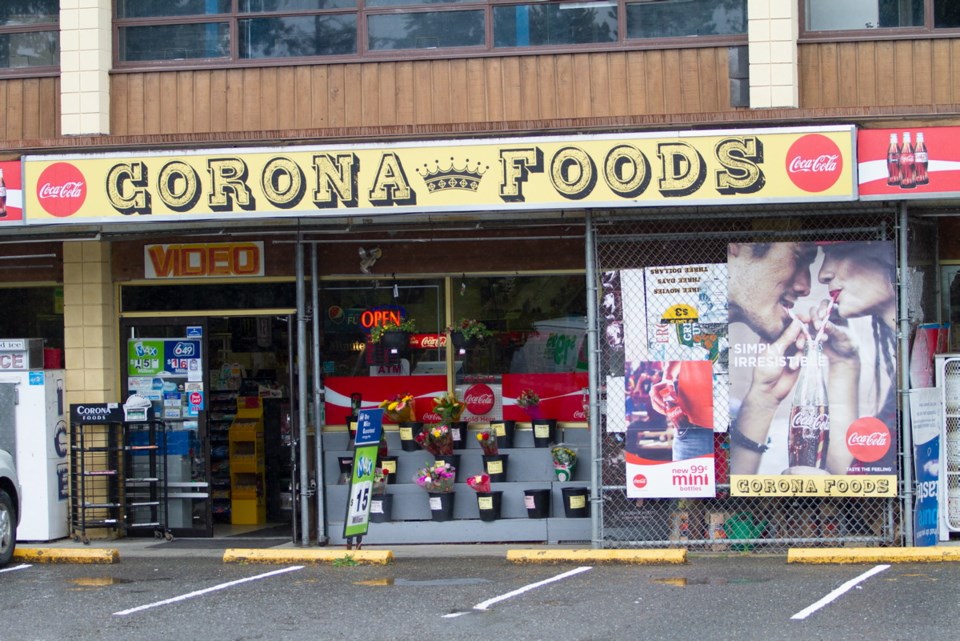Mike Lam was a little wary when his brother Jim changed the message on the marquee outside their Colwood store this spring.
“CORONA FOODS, NOT CORONA VIRUS,” it read.
No worries. “Everybody seemed to like it,” Mike now says. Customers saw the humour in a perfectly ordinary business name suddenly taking on a new connotation.
Yes, when your business name overlaps with that of a pandemic, all you can do is smile. It helps that it hasn’t deterred customers. Helps to be a neighbourhood fixture.
The thing is, the brothers aren’t even sure how Corona Foods, their Sooke Road market, got its name. It was already in place when they bought the business in 1991. Corona means crown — there’s a big red one on the sign out front — but it’s uncertain why the old owner chose it. (BTW, coronaviruses are so-named for the crown-like spikes on their surfaces.)
It raises the question: What happens when a perfectly innocuous name suddenly becomes synonymous with something less savoury. Does it really matter?
The most obvious example is Corona beer. In February, a much-cited survey (one of those polls that get wide play because they make us feel good about the stupidity of others) found 38 per cent of Americans would not buy the Mexican lager “under any circumstances now.”
In reality, though, Corona’s U.S. sales rose noticeably in March. The real threat is curtailed production in Mexico.
Similarly, the owner of Israel’s Corona print shop was just joking when he told the Jerusalem Post that he was “considering suing the coronavirus.” Sharing the name hasn’t hurt him.
Likewise, the popularity of Egypt’s Corona chocolates has surged since the outbreak. “The virus has been the best advertising we ever had,” a sales rep told Arab News.
Something similar happened in the mid-2000s in Australia, where sales of the sarsaparilla drink SARS rose following the same-named outbreak.
On the other hand, there’s the sad story of Ayds, an appetite-suppressing candy that sold well in the 1970s and ’80s until the emergence of the AIDS virus, then disappeared. Changing the name to Diet Ayds didn’t help, given the virus’s association with weight loss.
Some take steps to avoid confusion. Oregon’s Tea Party bookstore reportedly changed its name to Tigress Books rather than be associated with the right-wing political movement.
There are also cases where a name is simply jarring. A few years ago, the emergence of a new Middle East insurgent group meant a Halifax receptionist had to start answering the phone with the full name of her agency — Immigrant Settlement Integration Services — instead of her customary “ISIS, may I help you?”
It isn’t just businesses but people and places that find themselves dealing with suddenly notorious names. During the First World War, several Canadian communities felt compelled to rebrand as something less German-sounding. Berlin, Ont., became Kitchener. Dusseldorf, Alta., was retitled Freedom. Prussia, Sask., not only changed its name to Leader but dropped German street names in favour of numbers. Carlstadt, Alta., was renamed Alderson after the British commander of the first Canadian division in Europe, which was a bit of a bummer for him in that the village soon became a ghost town anyway.
Even the king wasn’t exempt: In 1917, anti-German sentiment also led our Royal Family to ditch the House of Saxe-Coburg and Gotha in favour of the current House of Windsor.
Other family names proved problematic later. Canada once had a smattering of Mussolinis and Stalins, even an Austrian-born Hitler who immigrated here in 1905 (he was Jewish, by the way) but they eventually vanished from the phone book.
I have written before about local people whose ordinary names became extraordinary partway through life: Victoria’s Michael Jackson was regularly serenaded with Beat It or Thriller, while the late Freddy Krueger, who drove the Victoria airport shuttle, used to dress up as the horror-movie character on Halloween. (He even lived on Saanich’s Elm Street at one point.)
A couple of years ago, Salt Spring Island’s Mike Tyson expressed relief that he no longer heard as many cannibalism jokes as he did in 1997 after the same-named heavyweight boxer, apparently hungry for something more than victory, bit off half of Evander Holyfield’s ear during a title fight.
Bad news: Both fighters, now in their 50s, were talking last week about staging a rematch for charity. For real. There’d be no heavyweight crown up for grabs, but the winner might enjoy a Corona.



